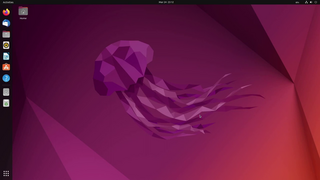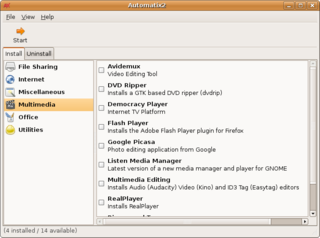
Debian, also known as Debian GNU/Linux, is a Linux distribution composed of free and open-source software and optionally non-free firmware or software developed by the community-supported Debian Project, which was established by Ian Murdock on August 16, 1993. The first version of Debian (0.01) was released on September 15, 1993, and its first stable version (1.1) was released on June 17, 1996. The Debian Stable branch is the most popular edition for personal computers and servers. Debian is also the basis for many other distributions that have different purposes, like Proxmox for servers, Ubuntu or Linux Mint for desktops, Kali for penetration testing, and Pardus and Astra for government use.

Ian Ashley Murdock was an American software engineer, known for being the founder of the Debian project and Progeny Linux Systems, a commercial Linux company.
Progeny Linux Systems was a company which provided Linux platform technology. Their Platform Services technology supported both Debian and RPM-based distributions for Linux platforms. Progeny Linux Systems was based in Indianapolis. Ian Murdock, the founder of Debian, was the founder and chairman of the board. Its CTO was John H. Hartman, and Bruce Byfield was marketing and communications director.

Xandros, Inc. was a software company which sold Xandros Desktop, a Linux distribution. The name Xandros was derived from the X Window System and the Greek island of Andros. Xandros was founded in May 2001 by Linux Global Partners. The company was headquartered in New York City with its development office in Ottawa, Canada.
Libranet was an operating system based on Debian.

The Linux Standard Base (LSB) was a joint project by several Linux distributions under the organizational structure of the Linux Foundation to standardize the software system structure, including the Filesystem Hierarchy Standard. LSB was based on the POSIX specification, the Single UNIX Specification (SUS), and several other open standards, but extended them in certain areas.

MEPIS was a set of Linux distributions, distributed as Live CDs or DVDs that could be installed onto a hard disk drive. MEPIS was started by Warren Woodford and MEPIS LLC.

A light-weight Linux distribution is one that uses lower memory and/or has less processor-speed requirements than a more "feature-rich" Linux distribution. The lower demands on hardware ideally result in a more responsive machine, and/or allow devices with fewer system resources to be used productively. The lower memory and/or processor-speed requirements are achieved by avoiding software bloat, i.e. by leaving out features that are perceived to have little or no practical use or advantage, or for which there is no or low demand.

Mark Richard Shuttleworth is a South African and British entrepreneur who is the founder and CEO of Canonical, the company behind the development of the Linux-based Ubuntu operating system. In 2002, Shuttleworth became the first South African to travel to space, doing so as a space tourist. He lives on the Isle of Man and holds dual citizenship from South Africa and the United Kingdom. According to the Sunday Times Rich List in 2020, Shuttleworth is worth an estimated £500 million.

Ubuntu is a Linux distribution derived from Debian and composed mostly of free and open-source software. Ubuntu is officially released in multiple editions: Desktop, Server, and Core for Internet of things devices and robots. The operating system is developed by the British company Canonical, and a community of other developers, under a meritocratic governance model. As of April 2024, the most-recent long-term support release is 24.04.

Canonical Ltd. is a privately held computer software company based in London, England. It was founded and funded by South African entrepreneur Mark Shuttleworth to market commercial support and related services for Ubuntu and related projects. Canonical employs staff in more than 70 countries and maintains offices in London, Austin, Boston, Shanghai, Beijing, Taipei, Tokyo and the Isle of Man.

Kubuntu is an official flavor of the Ubuntu operating system that uses the KDE Plasma Desktop instead of the GNOME desktop environment. As part of the Ubuntu project, Kubuntu uses the same underlying systems. Kubuntu shares the same repositories as Ubuntu and is released regularly on the same schedule as Ubuntu.
Freespire is a community-driven Linux distribution currently owned by PC/Open Systems LLC. It is derived from Linspire and is composed mostly of free, open source software, while providing users the choice of including proprietary software including multimedia codecs, device drivers and application software.
Goobuntu was a Linux distribution based on Ubuntu LTS. It was used by almost 10,000 Google employees. It added a number of packages for in-house use, including security features and disabled the installation of some applications, but was otherwise similar. Thomas Bushnell, a Google technical leader for the company's Linux desktops, displayed Goobuntu at LinuxCon 2012. Bushnell explained that "Goobuntu is simply a light skin over standard Ubuntu."

Automatix is a tool designed to automate the addition of applications, codecs, fonts and libraries not provided directly by the software repositories of Debian-based distributions.

LugRadio was a British podcast on the topic of Linux and events in the free and open source software communities, as well as coverage of technology, digital rights and politics.

CNR, or One-Click & Run, was a free one-click software delivery service that was created to make finding and installing Linux software easier. It assisted the user in finding and installing software on their computer, and sat dormant in the system tray when not in use.
Digital Cornerstone was a Linux and open source software company based in San Diego, California. It primarily targeted desktop computers with its flagship Linux distribution, Linspire. It was bought in 2008 by Xandros, Inc., a former competitor, and made a semi-independent subsidiary of the company.

Linspire is a commercial operating system based on Debian and Ubuntu and currently owned by PC/OpenSystems LLC. It had been owned by Linspire. Inc. from 2001 to 2008, and then by Xandros from 2008 to 2017.














